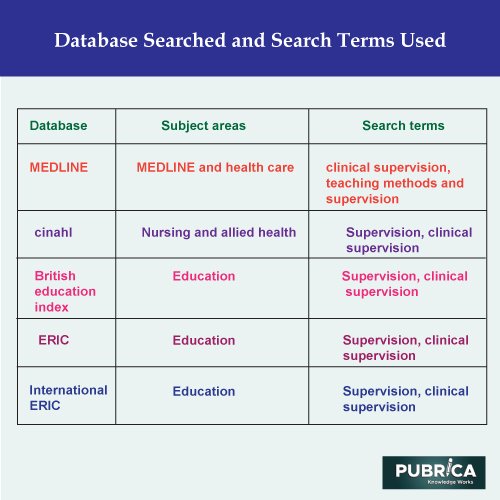
A Research study writing a Systematic Review in Clinical Investigation
December 17, 2021
Comparison of Medical and Social Science Journal Selection Factors
December 27, 2021In brief
Clinical supervision is essential in postgraduate and, to a degree, undergraduate medical education. However, it is likely the area of clinical education that has received the least attention, discussion, and development. This is the first large-scale, multidisciplinary assessment of Clinical Literature Review Services on supervision from medical education.
The empirical foundation of the literature is discussed, and the literature is reviewed to identify: understandings and definitions of supervision and its purpose;content of supervision; availability, structure, and theoretical models of supervision; adequate supervision; skills and; supervisor training and its effectiveness and qualities of effective supervisors.
Introduction
There is a small quantity of published medical research on supervision, with few empirical investigations. Because supervisory procedures in related professions can provide essential skills and insights for medicine, this review has included relevant literature from other healthcare professions, including nursing and social work, teaching, psychology, and counselling. The Literature Review Writing Services search included many academic and professional fields.
Table.1 Database searched and search terms used

A literature review examines published material in a particular topic area and information published within a specific period. As the topic develops, a literature review of a mature issue addresses the need for criticism of, and potential reconceptualisation of, the topic’s more extensive and more varied knowledge base. The second type of literature review is for new or developing issues and would benefit from a comprehensive conceptualisation and synthesis of the literature. The review is more likely to lead to an initial or preliminary conceptualisation of the issue, such as a new model or framework because these topics are relatively new and have not yet undergone a complete evaluation of the literature.
Methodological problems
Approximately 300 relevant articles and books were discovered throughout the Writing a Literature Review search. The majority of the empirical research was small-scale, exploratory, and qualitative. As a result, rigorous inclusion criteria were not applicable for this review, and meta-analyses were impossible. There was also no other large-scale, multidisciplinary evaluation (nor any review of medical supervision) that could be discovered. A bibliographic feature will be added to this review.
Effective supervision
Whether expressed explicitly or implicitly, the ultimate goal of monitoring is to improve patient/client care and experience. As a result, one significant test of good supervision is patient/client outcomes. Due to the numerous other variables that might influence, showing that a specific supervisory action directly affects the patient/client is quite challenging. As a result, some academics have looked at the impacts of supervision on the trainee/supervisee to get around this cause/effect problem. A large number of empirical research has been conducted to determine the impacts of supervision on trainees, customers, or both.
Medicine: empirical Literature studies of effects of supervision on patients
Quantitative Literature Review Help research suggests that supervision impacts patient outcomes. According to the evidence, less supervision of junior doctors in surgery, anaesthesia, trauma & emergency, obstetrics, and paediatrics is connected with an increase in fatalities. As a result, even though some trainees claim to profit from the experience that lack of supervision provides, patient care decreases when they are unsupervised. Furthermore, the unsupervised experience might lead to a willingness to tolerate lesser standards of care since the student may not be able to acquire proper practice without proper supervision.
Skills and qualities of effective supervisors
Effective supervisors assign tasks for patient care, opportunities to perform operations, opportunities to Best Literature Review Writing review patients, engagement in patient care, guidance, and constructive criticism to their subordinates. Basic teaching abilities, facilitation skills, negotiation and assertiveness skills, counselling and evaluation skills, mentoring skills, knowledge of learning resources, and certification requirements are all required in the UK for the PRHO supervisor.
Conclusion
The evidence gathered throughout this review has been summarized at the end of each section. It just partially answers and suggests answers to our initial questions. Rather than the supervisory procedures utilized, the nature of the supervisory relationship is arguably the single most significant component in the efficacy of supervision Literature Review Article. Feedback is an essential part of supervision, and it must be given transparently so that the trainee understands their strengths and limitations. The trainee must have some involvement and control over the supervising process. There are currently insufficient answers to the challenge of finding enough time for monitoring.
About Pubrica
Pubrica’s team of researchers and authors develop Scientific and medical research papers that can be indispensable tools to the practitioner/authors. Pubrica medical writers help you write and edit the introduction by introducing the reader to the shortcomings or empty spaces in the identified research field. Our experts know the structure that follows the broad topic, the problem, and background and advance to a narrow topic to state the hypothesis.
References
- Kilminster, Sue M., and Brian C. Jolly. “Effective supervision in clinical practice settings: a literature review.” Medical education 34.10 (2000): 827-840.
- O’connor, Siobhan, and Tom Andrews. “Mobile technology and its use in clinical nursing education: a literature review.” Journal of Nursing Education 54.3 (2015): 137-144.
- Aspland, Emma, Daniel Gartner, and Paul Harper. “Clinical pathway modelling: a literature review.” Health Systems 10.1 (2021): 1-23.
